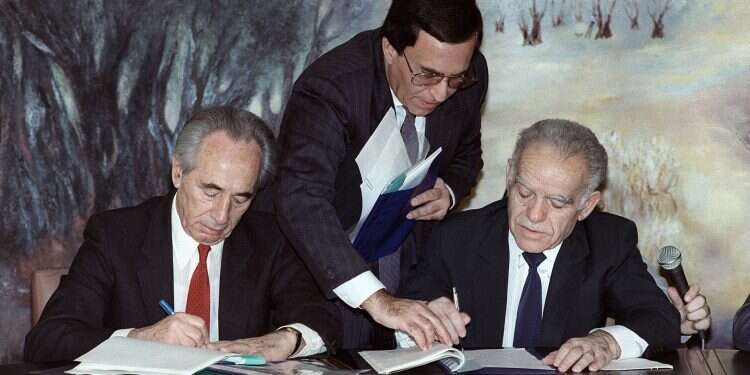The self-inflicted collapse of the Israeli Right in the 1992 elections, a failure that led to, among other things, the disaster that was the Oslo Accords, serves as a warning to those who in the name of ideological purism, would bring down a right-wing government. In order to avoid this phenomenon in the future, we must first understand the pervasive mood on the Right and the political ideas that dominated the right-wing of the nationalist camp at that time.
The protocols of a Knesset session some 4 years earlier, when Yitzhak Shamir was sworn in as prime minister in what would be the fifth government led by the Right following almost 30 years of left-wing rule, provide a fascinating insight into the spirit of the times. In the remarks of the ideologues on the Right, one can find all the familiar complaints.
The session began with a speech by Shamir, who was presenting the new national-unity government, this time without a rotating leadership. Shamir was at the head of this government, and Shimon Peres and Yitzhak Rabin, both of the Labor party, were to serve in the roles of foreign minister and defense minister, respectively.
In his speech, Shamir spoke of his hope for peace with the Arab states and presented Jordan as a solution to the Palestinian problem. Settlements in Judea and Samaria were to remain and be expanded, the status of Jerusalem was not up for discussion, and negotiations with the Palestine Liberation Organization were out of the question, he said.
Throughout his speech, Shamir was repeatedly interrupted by hecklers from the left.
The alternative to Shamir's vision was not just theoretical in nature. Representatives on the Left had stated their explicit commitment to entering peace talks with the PLO.
Shamir succeeded in enlisting Labor in a government that ruled out such negotiations, in an effort to present a broad and unified front to contend with international pressure on the subject.
But this did not interest the ideological hawks in the Knesset.
Yuval Neeman of the now-defunct ultra-nationalist Tehiya party opposed the very idea of a unity government. He accused the Likud of being a left-wing party in disguise, one that planned to carry out a massive withdrawal from territories in Judea and Samaria. According to Neeman, the Right would have been better off had the president tasked Peres with forming the government. Indeed just a few years later, he was to learn how wrong he was when Rabin and Peres took power.
Rafael Eitan of the now-defunct Tzomet party also opted to join the opposition. He accused the government of being ineffective because a series of reforms he "just had" to implement weren't moving as fast as he would have liked. You would not be wrong to compare his remarks with the accusations now being thrown at the current government.
Last among these ideologues was the late Moledet party founder Rehavam Zeevi, who said the government was incapable of contending with Israel's national security issues. "A broad government means a narrow state," he said, explaining why he would vote against the Shamir government.
Hindsight is one thing, but with another election set for September, what we need now is foresight. By now, it should be clear to all that the State of Israel would have been much better off had the 1990s been more like the 1980s. Yes, there was an intifada, but it was one of riots and knifings, not bombings and the rise of Hamas. True, reforms were not implemented quickly enough, but under Rabin and later Prime Minister Ehud Barak, we learned that the other side excels at effectively leading harmful revolutions. Yes, national pride sustained a blow when we bowed to American interests and canceled the IAI Lavi jet fighter program, but giving in to former U.S. President Bill Clinton and the Democrats' vision for peace could be far more destructive.
The Gaza Strip, the High Court of Justice, illegal infiltrators, the Bedouin encampment of Khan al-Ahmar and the like are important issues that need to be taken care of. But it seems that too many on the Right are eager to replace the government, which is not handling these issues with sufficient efficiency that will deepen failures and solidify the disaster. Instead of a leadership that has not done enough to rein in the courts, we will have a government that will broaden the progressive revolution. Instead of a government that has failed to remove enough illegal migrants, we will have a government that brings in many, many more. Instead of a government that fails to act on the demolition of Khan al-Ahmar, a new government will come in that will establish 10 more just like it. This is what is at stake.




